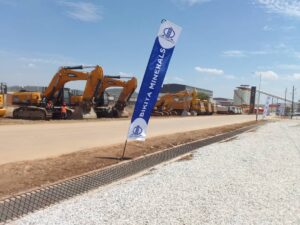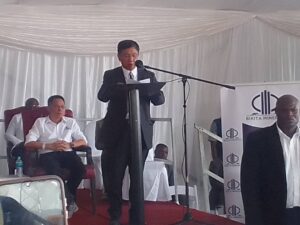Moses Ziyambi
Masvingo—President Emmerson Mnangagwa blended his praise for Bikita Minerals with thinly veiled jabs as he sought to balance conflicting interest regarding one of the most significant Chinese mining investments in the country.
Mnangagwa visited the lithium mine on Wednesday (29 November) to commission new spodumene and palatine processing plants that will add on to the long-running petallite processing unit.
Spodumene is considered the most valuable lithium ore component and is used in the manufacture of phones, laptops, digital cameras, automobile batteries and ceramics.
In January 2022, Sinomine Resources Group purchased Bikita Minerals at a cost of US$180 million from the African Metals Management Services (AMMS) which was controlled by Germans.

During his address, Mnangagwa who was accompanied by Vice President Constantino Chiwenga and Mines minister Soda Zhemu, among other government officials, applauded the Chinese-owned Sinomine Resources Group that owns Bikita Minerals for investing at least US$300 million into the lithium project.

President Mnangagwa subtly warned foreign miners at the commissioning event
But he severally diverged from his prepared speech to demand greater accountability, professionalism and high ethical standards from the mining sector in Zimbabwe, urging investors to ensure that their operations benefitted Zimbabweans as well.
“The expansion of the old petalite plant with the associated increase of petalite throughput to 480 000 tonnes per annum, up from the current 10 000 tonnes, should have broader ripple effects,” said Mnangagwa.
He called for greater scrutiny of the company’s mining operations to ensure that the country does not get short-changed by investors.
“Pazvinenge zvichicherwa, maziso edu nendangariro dzedu ngazvivepo, kuti zvashandira ani zvakawanda kupfuura vamwe. (As companies mine out minerals, our eyes and minds must be there to determine who is benefiting from the processes). As we carry out the mining at this place, we are taking minerals from the belly of the soil. The minerals cannot be regenerated and it will all be history after two to five generations,” said Mnangagwa.
He added: ““Kare taingorega vachichera, voti tatakura mavhu kuisa kunyika kwavo, tikati bodo. Kweshai mavhu tivone zvinoshanda muvhu takatarira. (We used to let them extract minerals anyhow, and they would simply export the ores, but not anymore. We now monitor closely while they do it). We need to see the full value chain of every single mineral endowed in our country,” he said.
Bikita Minerals was earlier this year in the eye of a storm for the widespread abuse of workers’ rights and the recruitment of undocumented Chinese nationals, resulting in its temporary closure by government.
There have also been recent reports of rife lithium ore smuggling from the company.
Implying that the country could be suffering prejudice in the form of undeclared minerals, Mnangagwa continuously queried the name”‘Bikita Minerals” instead of Bikita Mineral as only lithium was being officially mined.
“Names do not simply get registered without meaning. We must find out what else could be there,” he said.
In the past, major diamond and platinum mines have been reported to be under-declaring the mineral types they were extracting.
In May this year, a large haul of undeclared lithium ore from Bikita Minerals was impounded by the police at an industrial site in the city of Masvingo.
Police said the lithium was being prepared for smuggling to overseas markets through Mozambique and South Africa.
Mnangagwa said Zimbabwe needed to move quickly to develop value chains to ensure that even semi-processed minerals such as lithium concentrate processed by Bikita Minerals is no longer exported but value-added locally.
“The completion of the Mapinga Mines Industrial Park must be expedited. Down the line, we shall build plants for the full beneficiation of most of our minerals which today we are beneficiating to some extent without completing the chain,” he said.
The industrial park planned for Mashonaland West province will be a 5,000 hectare project worth an estimated US$13 billion and is meant to beneficiate local minerals.
It will require mining companies to localise the entire value chain of such key minerals as lithium by, for example, setting up electric vehicles battery manufacturing plants.
Earlier on, the Sino Mine board chairperson, Pingwei Wang, hailed the completion of the new plants in a record one year at a cost of US$200 million as a sign of the company’s commitment to the country.
“Since acquiring the Bikita mine, Sino Mine Resource Group has been dedicated to sustainable and mutually-beneficial development. We have ensured stable operations and an efficient management; improving employee welfare and creating job opportunities and taxes. We have so far contributed over US$40 million in taxes to the Zimbabwean government and created over 800 jobs. We have also supported local education, healthcare and infrastructure with US1.5 million for public amenities,” said Wang.

He said the company had also set aside US$10 million for the construction of a separate bridge across Save River to complement the old Birchenough Bridge, an arch span that was opened for public use in 1935.


Comments are closed.